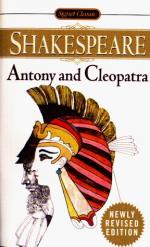|
This section contains 5,492 words (approx. 14 pages at 400 words per page) |

|
Rome and Egypt function effectively as characters in A many and Cleopatra, and the two are traditionally depicted as opposites. Rome, according to Sheila M. Smith, represents "military glory, honor, and moral duty"; Egypt represents "instinctive passion, ... extravagant love, fertility, and magnanimity." Rome, Cynthia Kolb Whitney suggests, values power and warfare; Egypt admires ease and sexuality. As William D. Wolf observes, Egypt has come to be regarded as "the place of love" and of private life, while Rome is the center of politics and public life. Smith, Whitney, and Wolf all share the view that Cleopatra personifies Egypt and Octavius Caesar embodies Rome; Antony, meanwhile, is caught between both worlds.
By the same token Wolf, along with Michael Platt and Larry S. Champion, argues that Rome and Egypt have several aspects in common. Platt, for instance, asserts that the two powers are on the wane and that...
|
This section contains 5,492 words (approx. 14 pages at 400 words per page) |

|




